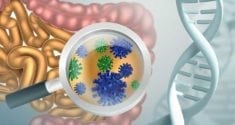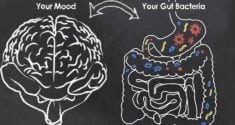Every time we consume food, we’re also feeding the bacteria that call our bodies home. The human body plays host to trillions of microorganisms, including thousands of species of bacteria, fungi and viruses. These microorganisms actually outnumber our own cells, and the vast majority of them reside in our digestive system.
Referred to as the gut’s microbiota or gut flora, the microorganisms that live in the gastrointestinal tract play fundamental roles in immunity, nutrient absorption and vitamin production. The microbiota influences cardiovascular health, blood sugar and hormone regulation, brain development and even has the ability to affect our mood and behavior. Every individual has a microbiota that is completely unique to them, and any imbalance in these microbes can potentially lead to sickness, disease and mental decline.
Researchers have uncovered links between our gut flora and diseases and illnesses such as:
- Alzheimer’s Disease
- asthma
- autism Spectrum Disorder
- cancer
- cardiovascular Disease
- depression
- diabetes
- Multiple Sclerosis
- obesity
- Post Traumatic Stress Disorder
There are many factors that can contribute to the composition and continual balance of the gut microbiota. Among the most important and easiest factors to address are diet and meal timing.
How Diet Affects Gut Health
Different species of bacteria have been found to thrive on different types of foods, and even if you take a probiotic supplement, what you eat can vastly alter your gut flora. Where we live and the regional foods we consume even play a large part in our microbiota composition. For instance, a recent study published in the journal Frontiers in Nutrition found that a Mediterranean diet promoted a healthier gut than a Western diet.
In their study, the researchers demonstrated that a Mediterranean diet, which is typically higher in plant fibers, whole grains, fish and poultry than a Western diet, increased the amount of the beneficial bacteria Lactobacillus by up to seven percent. The Western diet, which tends to be lower in fiber, with higher amounts of fat and refined carbohydrates, only increased the number of beneficial bacteria by 0.5 percent.
 Refined carbs and high-sugar foods are known to cause inflammation of the gut and promote the growth of bad bacteria. Research also indicates that the amount of and types of protein we consume alters the microbial diversity of our guts. For example, studies found that consumption of whey and pea protein increase the presence of certain beneficial gut bacteria while decreasing particular strains of pathogenic or bad bacteria.
Refined carbs and high-sugar foods are known to cause inflammation of the gut and promote the growth of bad bacteria. Research also indicates that the amount of and types of protein we consume alters the microbial diversity of our guts. For example, studies found that consumption of whey and pea protein increase the presence of certain beneficial gut bacteria while decreasing particular strains of pathogenic or bad bacteria.
How diet affects gut health is a large factor in our microbiota, but what we eat isn’t the only thing to consider when looking to improve your gut flora. Increasing research indicates that the size of meals and their frequency also impacts the gut’s microbial balance.
Meal Timing and the Effects on Your Gut
Most living organisms operate off innate circadian rhythms, and as it turns out, this includes our gut bacteria. A research article published in the scientific journal PLOS ONE demonstrated that bacteria commonly found in the human gut possess their own circadian rhythm and respond to fluctuations in the presence of hormones such as melatonin and tryptophan.
Our biological clocks are extremely sensitive to both the intake and restriction of energy. Research has shown that a disruption of these circadian rhythms can lead to numerous detrimental health effects such as diabetes, hypertension and irregular hormone levels. Structured eating regimens may provide the best way to avoid these disruptions and ensure optimal gut health.
Sometimes disrupting these internal clocks could prove beneficial, however. According to a recent study that was led by researchers from MIT and published in the journal Cell Stem Cell, it may be possible to shock our guts back to good health through fasting. In their study, the researchers discovered that a 24-hour fast in mice caused a metabolic switch that boosted the regeneration and reparation of gut stem cells.
In a study that was recently published by the American Diabetes Association, this reset of the gut microbiota that occurs with fasting was shown to have the added benefits of preventing blindness and promoting longevity. Yet another recent study, which was released by Experimental Biology, has shown that fasting may also improve heart function and help to slow the cardiac damage that accompanies heart failure.
The Bottom Line?
Our bodies are essentially more bacteria than they are human, and a proper balance to this bacteria is vital to our overall health, well-being, and longevity. The good news is that being more mindful of what we put into our bodies and when we do it are easy steps to correcting and maintaing the balance of this symbiotic relationship.



Leave a Reply